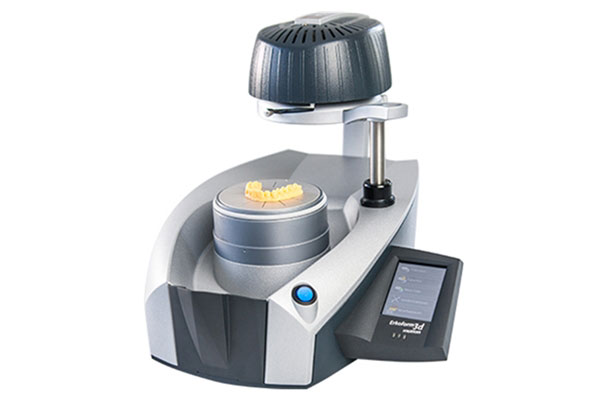Night Guard Lab from China
Robust Night Guard
Night guards are plastic-like braces that can be hard or soft. It covers the occlusal surface, protects and cushions your teeth from excessive wear and tear, and helps rebuild the natural space between your upper and lower teeth. Sleeping with a night guard is the most effective way to treat bruxism.
Since patients’ teeth are shaped differently, the night guard is custom-made for each patient and can be shaped to fit your teeth without being uncomfortable or unnecessarily bulky. It goes by many names. They can be called dental guards, mouth guards, nocturnal bite plates, or bite splints.
Featured Night Guards
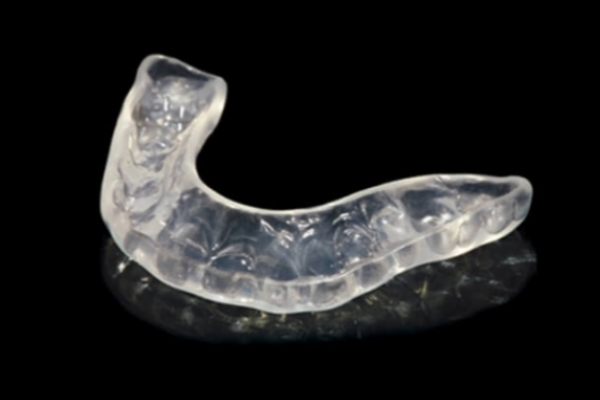
Soft Night Guard
A soft night guard, often made of materials like silicone or soft plastic sheet, offers a comfortable option for those experiencing teeth grinding or clenching during sleep. It is often thermoformed and the most cost-effective. While it may not be as durable as a hard night guard, its flexibility and softer texture can make it more comfortable to wear throughout the night.
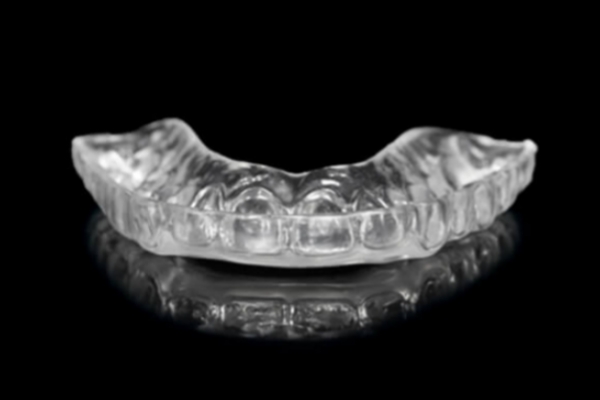
Hard Night Guard
A hard night guard, usually made from acrylic or hard plastic sheet, is specifically designed to withstand teeth grinding or clenching during sleep. It’s more durable and provides sturdy protection for the teeth compared to softer night guards. If you’re experiencing bruxism, a hard night guard might be recommended by a dentist for better protection.
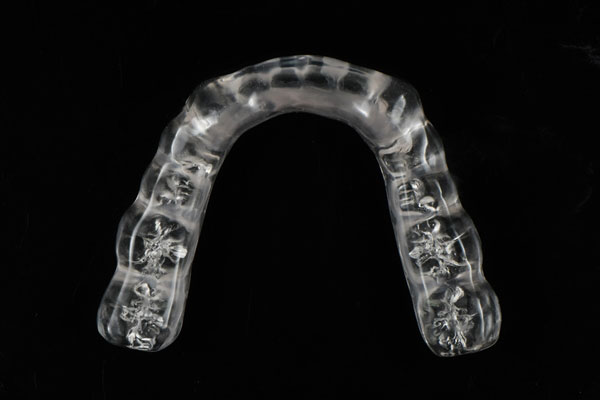
Hard and Soft Night Guard
A hard and soft night guard, usually made from acrylic and plastic sheet, is a combination of a hard exterior and a soft inner lining. This hybrid design offers the durability of a hard night guard on the outside to withstand grinding forces, while the inner soft layer enhances comfort during wear, providing a cushioned feel against the teeth and gums. It combines the protective aspects of a hard guard with the comfort of a soft one.
Night Guard Lab Equipment & Material
Robust Night Guard Specification
| Product: | Mouth guard/ Night guard |
| Mouth guard resin: | Dentaurum from Germany |
| Plastic sheet: | Erkodent from Germany |
| Vacuum foaming machines: | Erkodent; Druformat |
| Way of manufacturing: | Thermoforming |
| Warranty: | 6 months |
Night Guard FAQ Guide
1. What are the pros and cons of dental night guards?
A night guard is just like the mouthguard that athletes use on the sports field. It can be fitted over the upper or lower teeth to create a physical barrier that prevents damage from grinding and encourages jaw muscle relaxation.
Advantages of dental night guard
- They are easy to use. Using night guards is simple. Just put it in your mouth before going to bed.
- They prevent tooth damage. Wearing night guards can keep your teeth from grinding all the time. You might still be clenching your teeth, technically, but the night guard will keep the damage to a minimum.
- They support better sleep. People with bruxism often experience poor sleep due to full or partial awakening as they cling to things. Wearing a night guard breaks that mold.
- They are adjustable. Your dentist can adjust the custom night guard to make it better for you.
Special night guards treat various conditions. Night guards aren’t just for bruxism. They can also be used to treat temporomandibular disorders, sleep apnea, and misplaced bites. Working with your dentist can provide hands-on, personalized care.
There is no perfect treatment for bruxism, even though night guards are highly recommended.
Disadvantages of night guard
- Waiting time. Night guards are bespoke. Your dentist will make an impression on your mouth in the office. Depending on the type of night guard you need, you can create guards in the field, but sometimes you need to send them to Robust dental lab and wait for the device to be crafted. It takes time.
- Cost. Many insurance plans don’t include night guards, so they can be expensive. They also need to be replaced regularly.
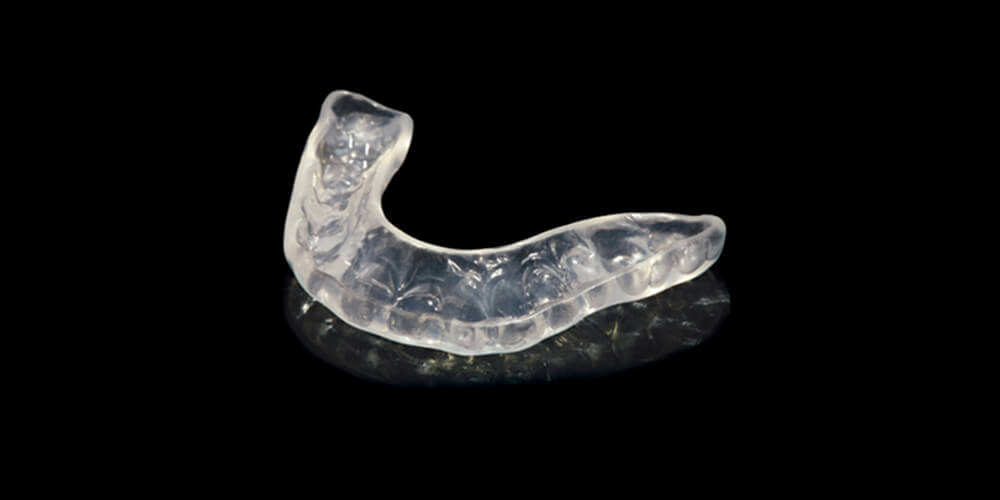
2. How many types of night guards are there in the market?
Night guards can be soft, hard or hard and soft, but there are 2 types of night guardsin general:
Over-the-counter night guards
Drugstores have over-the-counter night guards (usually hard night guards), and they’re all-purpose. They’re pre-shaped to fit any mouth. They also have the option of night guards that are cooked to bite but have to be softened in hot water to fit better. Unfortunately, these guards are not very comfortable and prolonged use of these devices can cause changes in your bite, because they are not designed specifically for the shape of your teeth.
Customized night guards
This is a personalized solution, as they are made from impressions of your teeth. Dentists use your dental impressions or digital scans to design more comfortable nightwear for you. With proper care and adjustment, these devices can function so much better and offer better protection to your teeth.
Please note Robust dental lab professionally produces personalized hard and soft night guards, soft night guards and hard night guards.
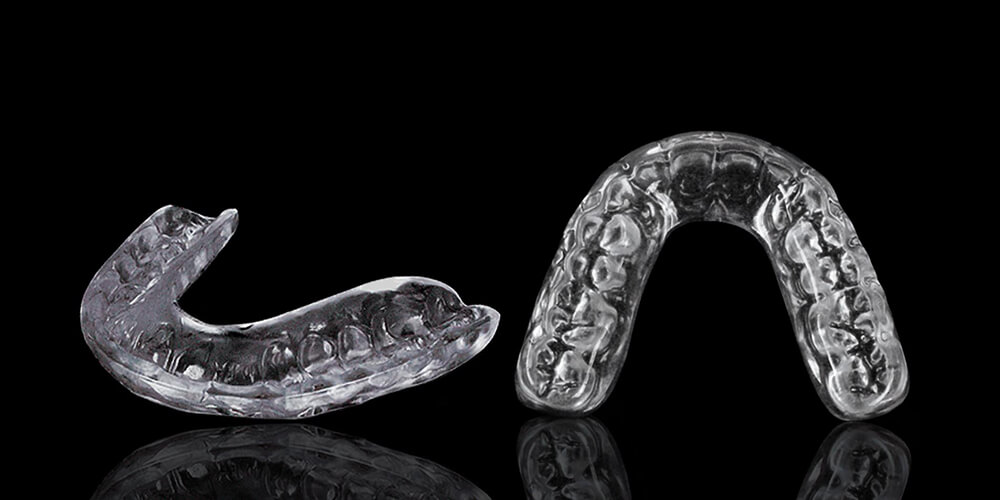
3. How to get a custom night guard?
The process of using a tooth protector during sleep is simple and painless. Your dentist takes an impression of your teeth. This impression is used to make stone models, and the lab will use FDA and CE marked plastic sheet and acrylic to make your night guard. Once done, the dentist will check the guard to make sure it fits. Then you just have to wear the guard while you sleep. It may seem a little odd at first, but most of our patients get used to wearing nighttime gear quickly. The guards won’t interfere with your breathing and you can still speak normally. Most people who complain about uncomfortable mouth guards are either wearing over-the-counter equipment or wearing ill-fitting equipment.
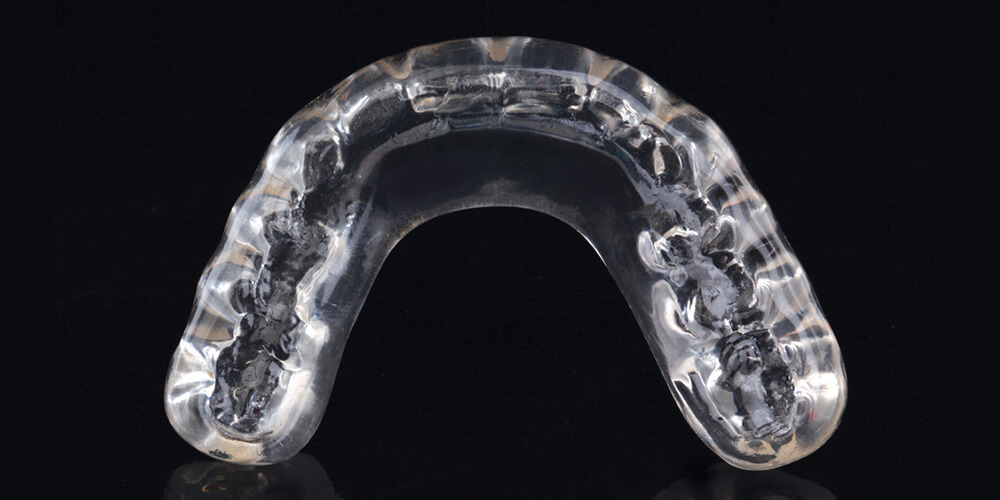
4. How to choose a night guard?
Usually, upper dental night care is recommended, because they are not as easy to remove as lower dental night care. Although, a dentist may recommend low wrist braces as they are easier and more comfortable to wear. Regardless, the night guard you need is one that protects your teeth without affecting your natural bite.
Since night mouth guards can be worn on the top or bottom of your teeth, you may be wondering which is best for you to maximize your prevention of teeth grinding. You should consider the following factors when making your decision:
An uncomfortable night guard probably won’t get into your mouth because you’re afraid to wear it. Therefore, comfort should be your priority. If you grind your teeth subconsciously during the day, you should use a lower mouthguard. It’s less conspicuous, and you most likely don’t want to be noticed. Also, if you have a sensitive gag reflex, a low night guard is appropriate. However, an upper night guard is usually more invasive, as it is larger and bulkier than a lower night guard.
The condition of your teeth should play a role in helping you decide on the ideal night guard. Because the custom Night guard is made based on your teeth prints, you should choose a set that doesn’t have too many missing and crooked teeth. That way, you’ll have a better fit.
5. How much does a night guard cost?
The cost of a custom night guard will vary depending on the exact materials and appliances used. In most cases, a night guard cost is far less than veneers, crowns, root canals, or other treatments used to correct damage from grinding and clenching. If your dentist thinks nighttime prevention is the right treatment for bruxism or temporomandibular syndrome, Robust will provide you with an estimated cost. If you have dental insurance, all or part of the cost may be reimbursed.
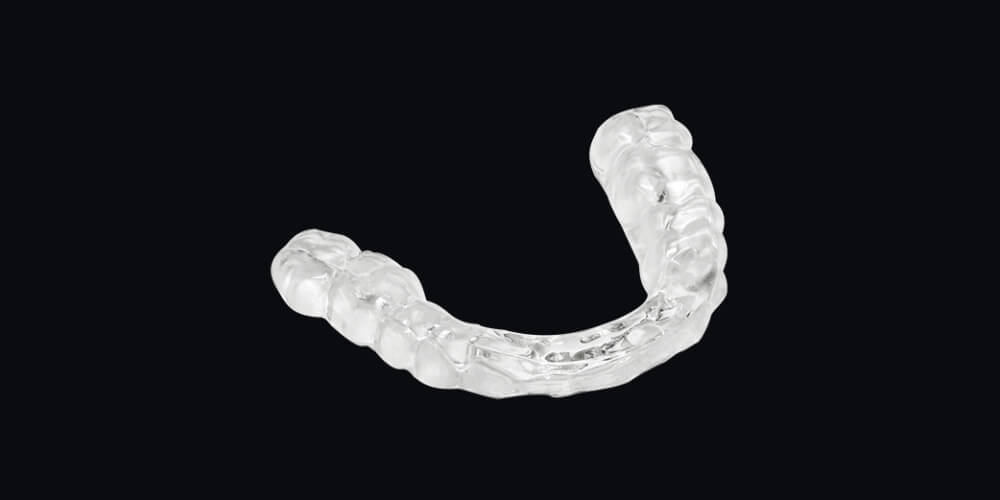
6. How long can night guard last?
A night guard usually lasts 2 years, but we suggest to replace your night guard every year, in order to ensure its functionality. However, the lifespan of a night guard depends entirely on how badly you grind your teeth. The more exposed it is to the pressure of molars, the thinner it becomes and the more likely it is to break.
7. How to properly care for your new night guard?
Now that you have a night guard, it’s important to take proper care of it, so it can protect your teeth for as long as possible. Your daily oral health should include nighttime cleanings. Follow these complete instructions to clean your night gear and it should stay in great shape for the year long.
- Wash immediately after wearing
Every time you put on your night guard, rinse them with warm water immediately after removing them from your mouth. This will remove debris and loosen any patches stuck to the night guard.
- Brush your teeth with a toothbrush
After rinsing, lightly brush the night guard with a regular toothbrush. Some people prefer to use a separate toothbrush at night, but if you want to use the same toothbrush you brush with every day, that’s fine.
Note: You don’t need to put toothpaste on your toothbrush. Because toothpaste is abrasive, it can scratch your night guard and make them wear out faster. Dish soap or castile soap is a great non-abrasive everyday cleaner.
- Put the night guard on a clean surface and let it dry completely
It is important to let your night guard dry completely before storing to prevent rapid bacterial growth. Choose a clean, flat surface and let your night guard dry. Within 15-30 minutes, it should be dry.
- Put your Night Guard in a chest
When you’re not wearing a night guard, it’s important to keep it in a case. Many people keep a night guard in the bathroom, but over time, the steam and humidity in the bathroom can cause the night guard to deform. We recommend that you keep a night guard on your bedroom or nightstand. Be careful not to place your night guard anywhere where extreme hot or cold temperatures can occur. Be aware that pets love new chew toys, please keep your night guard safe with your pet.
- Monthly deep cleaning of your night guard
Get in the habit of deep cleaning your night guard at least once a month. There are several ways to accomplish this.
The first method is to use an over-the-counter, non-abrasive denture cleaner. Simply place your guard in a glass or bowl filled with water and allow the cleaner to completely dissolve in the water. The second way to deep clean your night guard is to use a mixture of vinegar and hydrogen peroxide. For at least 30 minutes, soak the night guard in distilled white vinegar. After soaking, rinse the shield and bowl with water. Then soak in hydrogen peroxide for at least 30 minutes. Once done, rinse with water and let the night guard dry completely.
Tip: Don’t let your night guard soak in anything for more than an hour. Prolonged exposure to liquids can damage the material of your night guard. Also, don’t soak in any alcoholic liquids, including Listerine.
If you put a clean night guard in a dirty box, then cleaning the night guard is a waste of effort. Hand washes with regular dish soap or Castile soap every few days to keep the crust clean. Avoid putting plastic boxes in the dishwasher, as high temperatures can melt or deform plastic boxes. After washing, let the case dry to prevent bacterial growth.
It is advised to wash your night guards at least once a month. Over-the-counter denture cleaners are non-abrasive. Put your night guard in a container with water, and the cleaner dissolved into it.
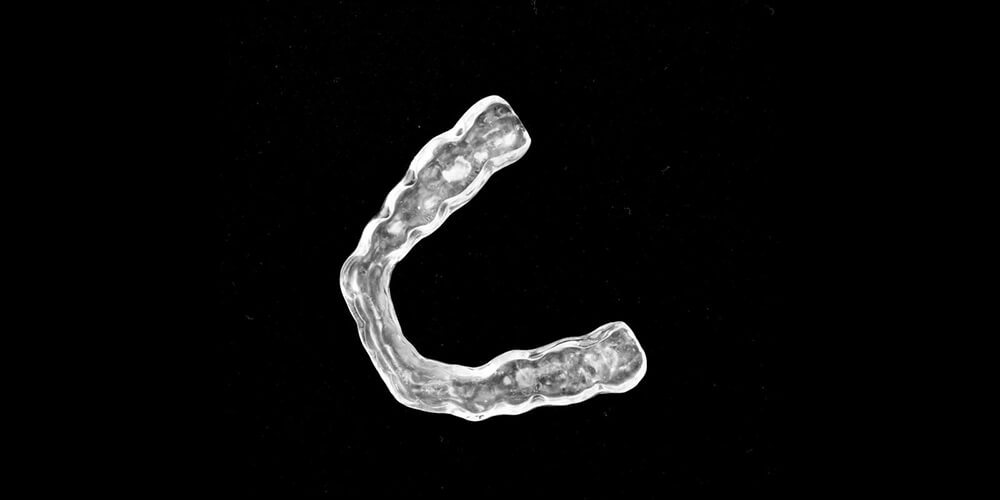
8. What is the difference between a sports mouth guard and a night guard?
There are actually some clear differences between a sports dental guard and a night guard. Here we would like to explain from two main perspectives.
Prevent Plaque Development
Despite the similar names, you shouldn’t confuse sports mouthguards with mouthguards that prevent grinding and clenching. Sports mouthguards do more harm than good. It covers the teeth and gums as it protects them from blunt instruments. If worn at night, it can trap bacteria on the surface of your gums while you sleep because saliva cannot reach your gums while wearing a sports mouthguard.
Saliva helps neutralize the acids that cause tooth decay and flushes away food particles, preventing the development of plaque. Therefore, when looking for a night guard, it is best to consult an oral hygiene professional to avoid damaging your teeth. It’s worth noting that some night guards have holes in them that allow saliva to touch your teeth. Therefore, a dentist will provide you with the correct design based on the condition of your teeth.
Prevent Changing Your Bite
Night guards are usually mounted precisely on your teeth and teeth, as their purpose is to protect the tooth surfaces from rubbing against each other. Because sports mouthguards are soft and made of thicker rubber material, they are not designed for your bite. Soft material will make you chew while you sleep because the brain interprets it as food. This can cause muscle discomfort and premature wear of the soft material on the pad. If you choose to wear a sports mouthguard at night, it can cause your bite force to change over time. After a while, the effect will show when something you bite changes.
9. Can I drink while wearing a night protector?
Yes, it is OK to drink water with braces. Be sure to floss and brush your teeth before wearing to make sure there are no food and bacteria that can cause cavities and stains in your braces.
10. Can the night guards change your teeth?
Night guard can change your teeth, especially if it’s not made for your mouth. If you use an over-the-counter night guard or one that only covers your front teeth, chances are your back teeth will be displaced due to the pressure exerted by your lower jaw. That’s why it’s better to wear a custom night guard, as it protects not only the teeth but also the jaw, reducing the chance of tooth shifting.
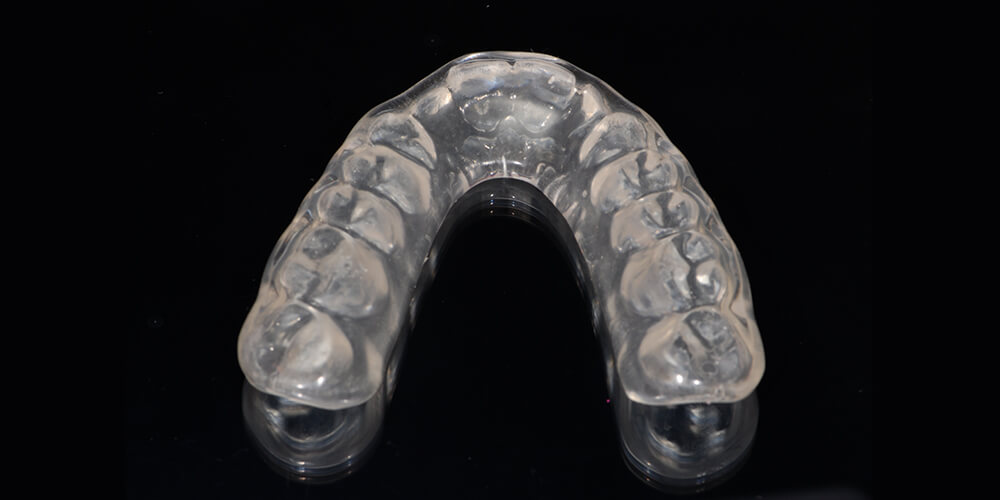
11. Should you wear a night guard every night?
Yes, you should wear a night guard every night, especially if you have severe bruxism. Not wearing a mouthguard every night can still cause damage to your teeth, just at a much slower rate. You may also experience bruxism side effects if you accidentally wear a mouthguard, especially while sleeping. Your doctor will also recommend how often you should wear a night guard, and you should strictly follow their instructions.
12. Can night guards hurt your teeth?
Night guards are small trays that you put on your teeth while you sleep. These trays provide a protective barrier to prevent damage to your teeth from occurring. They don’t cause any pain when you wear the goggles. When you wear the device for the first time, you may notice it in your mouth. However, after a while, you hardly notice it.
If you experience pain or sore mouth after putting on the night shield, this is a sign that the night shield is not properly seated in your mouth. It may be too large or too small to provide adequate protection. In this case, it is best to go to a TMJ clinic for the proper installation of your night guard.


